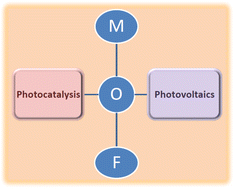Photoelectroactive metal–organic frameworks
Abstract
The remediation of environmental issues and solving energy crises are long-term challenges given the increasing world population and limited, unsustainable resources. Among the various possibilities, solar energy represents a clean, sustainable, and renewable technique for providing humans with power. Inspired by photoactive reactions in nature, such as photocatalysis in self-sustaining ecosystems, artificial photocatalysts based on metal–organic frameworks (MOFs) are broadly designed for hydrogen evolution from water, value-added chemicals from carbon dioxide, nitrogen fixation, energy-saving organic transformations, and photodegradation/photocatalytic removal of pollutants in the air (e.g., aldehydes and aromatics) and pollutants in waste water (e.g., dyes, antibiotics, pesticides, herbicides, phenols, formaldehyde, and hexavalent chromium). Photovoltaic cells based on MOFs including perovskite solar cells (PSCs), organic solar cells (OSCs), dye-sensitized solar cells (DSSCs), MOF-sensitized solar cells (MSSCs), and quantum dot-sensitized solar cells (QDSSCs) have been rapidly developing over the past few years. This review article covers recent progress in the aforementioned topics and discusses future directions.

- This article is part of the themed collection: Journal of Materials Chemistry A Recent Review Articles


 Please wait while we load your content...
Please wait while we load your content...